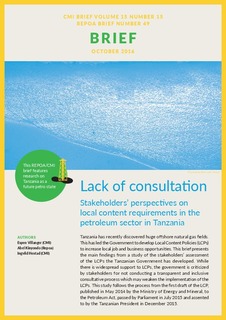Lack of consultation. Stakeholders perspectives on local content requirements in the petroleum sector in Tanzania
Report
Permanent lenke
http://hdl.handle.net/11250/2475314Utgivelsesdato
2016-10-01Metadata
Vis full innførselSamlinger
- Publications [1488]
Originalversjon
Bergen: Chr. Michelsen Institute (CMI Brief vol. 15 no. 15) 4 p.Sammendrag
Tanzania has recently discovered huge offshore natural gas fields. This has led the Government to develop Local Content Policies (LCPs) to increase local job and business opportunities. This brief presents the main findings from a study of the stakeholders’ assessment of the LCPs the Tanzanian Government has developed. While there is widespread support to LCPs, the government is criticized by stakeholders for not conducting a transparent and inclusive consultative process which may weaken the implementation of the LCPs. This study follows the process from the first draft of the LCP, published in May 2014 by the Ministry of Energy and Mineral, to the Petroleum Act, passed by Parliament in July 2015 and assented to by the Tanzanian President in December 2015. The importance of a proper policy process LCPs have been applied both in developing and developed countries as a tool to create jobs, promote enterprise development and accelerate the transfer of skills and technologies. Yet, LCPs are controversial. They may entail a redistribution of benefits that often trigger rent seeking, corruption and non-productive. There are inherent difficulties with the ambition of LCPs to bring developing country labor and companies into the high-tech petroleum business. The high level of skills, knowledge and technology required poses a barrier that is sometimes insurmountable in the relevant project period. This mismatch can be hard to comprehend for parties outside the petroleum value chain. The challenges and complexities posed by the introduction of an LCP underline the need for a thorough consultative process with stakeholders in order to manage expectations about what can be achieved and to prepare for effective implementation. An in-depth consultation process with stakeholders adds to the knowledge base of the decision makers and ensures that divergent views and positions are made public. Consultation can be an effective approach for the government to commu
